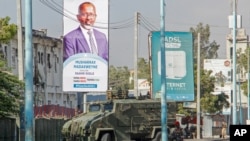The four-year term in office of Somalia’s President Mohamed Abdullahi Mohamed, also known as Farmaajo, ended on February 8, but he has remained in office due to a protracted stalemate with the country’s Federal Member State leaders over how to hold elections.
On April 12, the lower house of Somalia’s Parliament voted to effectively extend the mandate of the Federal Government and Parliament by two years, short circuiting efforts to resolve the impasse and hold elections immediately. Just one day later, President Farmaajo signed the bill.
The international community, including the United States, is objecting to a mandate extension, calling it a grave threat to the peace and stability of Somalia and its neighbors, warning that the al-Shabaab terrorist group could take advantage of the resulting disunity. The United States and others in the international community are also warning that a mandate extension and continued political gridlock will obstruct Somali leaders’ ability to meet the pressing needs of Somalia’s people.
“We have… made clear that the United States does not support mandate extensions without broad support from Somalia’s political stakeholders, nor does the United States support parallel or partial electoral processes,” said Secretary of State Antony Blinken in a written statement. “Such actions would be deeply divisive, undermine the federalism process and political reforms that have been at the heart of the country’s progress and partnership with the international community, and divert attention away from countering al-Shabaab. They will also further delay holding the promised elections awaited by the Somali people.”
Secretary Blinken warned that the United States may impose sanctions and visa restrictions. The United States may also reevaluate U.S. assistance to Somalia, a country that depends heavily on outside aid for basic needs such as food, as well as to train and equip its security forces
Secretary Blinken called on Somalia’s Federal Government and Federal Member State leaders to return to the negotiating table and find a way to resolve the electoral crisis. “We urge all parties to exercise maximum restraint, continue dialogue, and avoid further unilateral actions that will inflame tensions and undermine Somalia’s democratic processes and institutions.”






